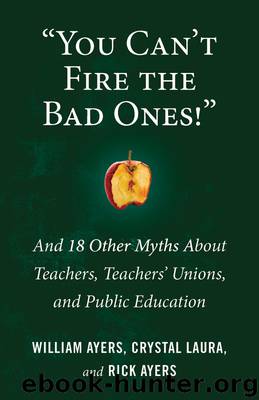You Can't Fire the Bad Ones! by William Ayers

Author:William Ayers [Ayers, William; Laura, Crystal; Ayers, Rick]
Language: eng
Format: epub
ISBN: 9780807036679
Publisher: Beacon Press
Published: 2017-11-09T05:00:00+00:00
Good teaching unsettles the questions and invites authentic inquiry. And yes, that has an activist edge. Powerful science and math education does not divorce numerical processes from the social context they live within. Deep learning happens when students work together to solve problems, often inventing the processes or rules necessary to solve those problems.
There is a fundamental incompatibility between the kind of faith in their own infallibility —their hallucinatory megalomania—that too many government leaders and members of the political class seem to harbor, and the practice of scientific inquiry. Politicians tell us that activism and teaching must be separated. In truth, they must be integrated, for they are the same thing.
“Activism” gets a bad rap in our society, and so do the teachers who take it seriously. Any mention of the word conjures vivid images of conflict or chaos, and many perceive that as somehow disconnected from the work of schools. In truth, however, schools in the United States have always served specific public goals that teachers are expected to be instrumental in embracing, enacting, and ensuring. These goals can be broken down into three broad categories: political, social, and economic.
Teachers are asked to induct the young into the polity and the larger democratic order, to prepare them to be actors and leaders in a free society. Teachers are also tasked with cultivating a sense of responsibility and participation in their students, and they are responsible to prepare students for the world of work or a career. Teacher activists can embrace these universal goals in unique ways and can work toward socially just transformational change inside and outside of the classroom. The politics of transformational change require challenging dominant interests and the beliefs and practices that sustain unjust power in everyday life. This change is not bound to or defined by the images of chaotic rabble-rousing demonstrations that the word “activist” may invoke in some. Instead, teacher activists are charged with being politically astute educators. Their work calls them to contribute to equity in outcomes for students, schools, and the wider community in concrete as well as metamorphic ways. An activist orientation develops when educators begin to understand their practices and themselves as responsible and vital participants in relationship to the dynamic society in which they live and work.
Yet the label invites discomfort for teachers who proclaim the title and for those who witness these proclamations. Teachers, and those who come to know and love teachers, often feel more comfortable with the other formal and informal roles teachers take on—mentor, parent, guide on the side, sage on the stage, and counselor. In the current era of standardization, accountability, and corporate-style schooling, the word “activist” often triggers an accelerated heartbeat and an audible sigh. Because of these reactions, teacher activists often find themselves on the defensive with colleagues or supervisors for paying too much attention to happenings outside the classroom, presumably at the expense of what’s going on inside it.
Despite the grumblings, teacher activists forge ahead, relying on their understandings of
Download
This site does not store any files on its server. We only index and link to content provided by other sites. Please contact the content providers to delete copyright contents if any and email us, we'll remove relevant links or contents immediately.
The Art of Coaching Workbook by Elena Aguilar(48037)
Trainspotting by Irvine Welsh(20045)
Twilight of the Idols With the Antichrist and Ecce Homo by Friedrich Nietzsche(17703)
Fangirl by Rainbow Rowell(7827)
Periodization Training for Sports by Tudor Bompa(7323)
Change Your Questions, Change Your Life by Marilee Adams(6637)
This Is How You Lose Her by Junot Diaz(5753)
Grit by Angela Duckworth(4728)
Red Sparrow by Jason Matthews(4654)
Asking the Right Questions: A Guide to Critical Thinking by M. Neil Browne & Stuart M. Keeley(4566)
Paper Towns by Green John(4163)
Room 212 by Kate Stewart(4099)
Ken Follett - World without end by Ken Follett(3968)
The Sports Rules Book by Human Kinetics(3581)
Housekeeping by Marilynne Robinson(3396)
The Motorcycle Diaries by Ernesto Che Guevara(3325)
Introduction to Kinesiology by Shirl J. Hoffman(3297)
Exercise Technique Manual for Resistance Training by National Strength & Conditioning Association(3286)
Double Down (Diary of a Wimpy Kid Book 11) by Jeff Kinney(3267)
